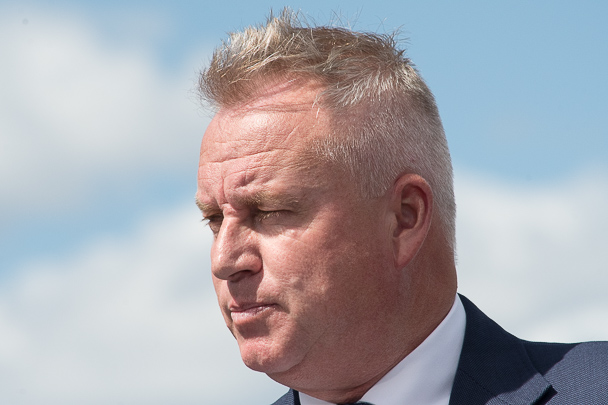Tasmanian Liberal Premier rejects voluntary disclosure of donations before polling day

Tasmanian Premier Jeremy Rockliff has ruled out repeating the Liberal party’s 2021 commitment to voluntarily disclose major donations received during the state election campaign.
When then Premier Peter Gutwein called an election in March 2021, he sought to defuse public concern over the government’s failure to introduce electoral reform legislation by committing to voluntarily disclose within two business days all donations of more than $5000. Labor leader Bec White matched Gutwein’s commitment.
Asked by Tasmanian Inquirer whether he would emulate Gutwein’s commitment, Rockliff said: “We will be guided by the current laws”.
Tasmanian law does not require any disclosure of political donations. Rockliff did not elaborate on why he wouldn’t renew Gutwein’s commitment.
The Labor party did not respond to requests for comment on whether they would voluntarily disclose donors before the March 23 poll.
The effect of Gutwein’s 2021 commitment was limited. The Liberals disclosed just one donation - $50,000 from a Melbourne-based donor, Richard Smith. Labor also disclosed just one donation - $10,000 from SeaRoad Holdings, which operates a shipping and freight service across Bass Strait. Both parties deleted the details of the donations from their websites after the election.
Australian Electoral Commission data published in early 2022 revealed despite Gutwein’s promise the Tasmanian Liberals did not disclose at least $69,600 in donations received before the 2021 election. A further $24,000 received after the election was not disclosed.
The discrepancy occurred because, while Gutwein repeatedly committed to disclose all donations received during the election period, the Liberal party secretariat only revealed contributions explicitly earmarked for their state campaign account.
Five-year delay and another election with no disclosure
In late 2023, the Electoral Disclosure and Funding Bill finally passed the Tasmanian parliament, more than a year after it was introduced in the lower house and five years after then premier Will Hodgman promised donations disclosure. The act requires the disclosure of donations of more than $5000 in a year to a registered party or candidate. It requires donations to be disclosed within two weeks if made during an election campaign.
But the disclosure scheme, which will be Australia’s weakest, is not likely to come into effect until later this year or early 2025.
With the state-based scheme yet to be implemented, the only public information on donors to Tasmanian parties comes from the Australian Electoral Commission (AEC), which regulates donations to candidates and parties contesting federal elections.
The most recent AEC return of the Tasmanian Liberals revealed it received more than $2.5 million in 2022-23, including $100,000 from the Gatenby Investment Fund, $22,000 from Google Australia and $16,500 from the Financial Services Council. The federal Liberal party contributed almost $296,000.
Returns submitted by donors revealed the origin of an additional $322,315, including $22,850 from a logging industry lobby group, the Australian Forest Products Association, $13,200 from a drug industry lobby group, Medicines Australia, and $14,300 from the federal office of the Australian Hotels Association. The Liberal party’s return also said it received $20,000 from the Pharmacy Guild of Australia, though the powerful lobby group for pharmacists reported $22,200 in contributions.
“The single biggest thing that is eroding the democratic process is the money that is going into these parties they will not disclose”. Craig Garland, independent candidate in Braddon.
Tasmanian Labor had income of slightly more than $1 million, with the only disclosed donation being $16,315 from SDA Australia, the union for retail workers.
With the federal disclosure threshold set at $15,200 in 2022-23, the bulk of donations remained beyond public view. Both the Liberal and Labor parties use secretive fundraising forums for corporate contributors to help bankroll their operations.
In November 2023, the Tasmanian Greens’ Rosalie Woodruff asked Rockliff in parliament whether he had attended a $4400-per-head Liberal party fundraising dinner attended by salmon industry executives. She alleged Rockliff had told the salmon industry executives: “We have a 10-year salmon expansion plan. It’s not going to be popular, but I’m here to tell you we will back your industry all the way.” Rockliff repeatedly declined to directly address the question when asked in and out of parliament.
The Labor party also has a forum for business contributors. A $550-a-head dinner with state leader Rebecca White and the shadow minister for finance, Dean Winter, in December 2021 offered donors the opportunity “to hear about and have input into Labor’s policy focus and direction”. The event organiser was Labor state secretary Stuart Benson, now a candidate for the Hobart-based seat of Clark.
The strongest support for disclosure of donors to Tasmanian political parties has come from the Greens, independent lower house MP Kristie Johnston, and independents in the state’s upper house. Johnston has said she does not accept political donations. The Greens disclose on their website all donors who contribute more than $1500.
The lack of donation disclosure by the Labor and Liberal parties has spurred at least one candidate to run as an independent. Speaking to ABC radio host Leon Compton, Craig Garland, a high-profile candidate at previous state and federal elections, announced he would run again in the seat of Braddon, with donations disclosure his number one priority. “The single biggest thing that is eroding the democratic process is the money that is going into these parties they will not disclose,” he said.
 @BobBurtonoz
@BobBurtonoz